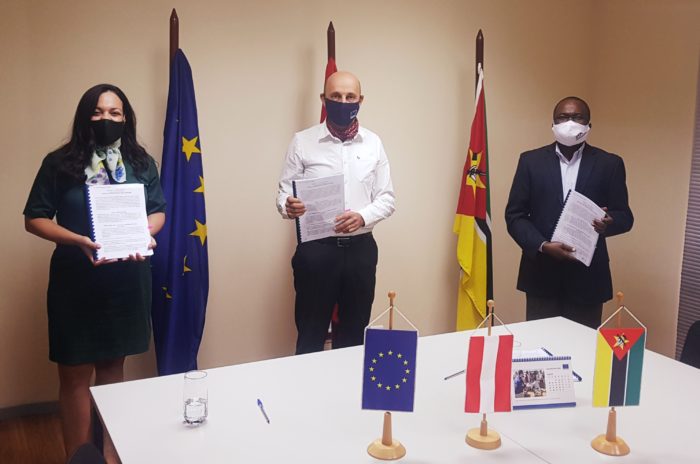
NCBA CLUSA´s work in Mozambique is expanding to the Sofala Province with the new Climate Smart Agriculture and Water in Sofala (CSAW Sofala) project. This four-year, 1.3 million EURO project will be the first collaboration between NCBA CLUSA and the Austrian Development Agency in Mozambique.
The project will be implemented through a nexus approach that links climate-smart agriculture practices, increased market access, and increased access to water and energy sources. The project will aim to increase productivity (higher yields per plot) and thus increase incomes, and improve access to water and sanitation to 7,800 smallholders in the districts of Buzi, Caia and Machanga of Sofala Province.
Key project activities include the provision of training on climate smart agriculture practices to public extensionists, the establishment and/or refurbishing of water points that serve for human and animal consumption as well as for irrigation, and supporting farmers adopt climate smart agriculture practices and learn about efficient uses of water.
CSAW Sofala will be carried out in close collaboration with the Provincial Government of Sofala and the economic development and WASH authorities of each of the project´s target districts. We will also be coordinating closely with the International Institute of Tropical Agriculture (IITA), who will be implementing complementary activities funded by the Austrian Development Agency in the same districts.
NCBA CLUSA currently has three other active projects in Mozambique- SEEDS+, TVET for the Agricultural Sector and PROMAC II. SEEDS+ is a USAID Fintract Partnering for Innovation funded project that aims to increase access to climate index insured seeds by farmers in Central and Northern Mozambique. The project is a being implemented in collaboration with Phoenix Seeds company and Hollard Insurance. Funded by NORAD, TVET works to increase the practical and technical capacities of the agricultural workforce in Mozambique through the completion of vocational training courses and has established a Model Farm, to serve as an educational/demonstration tool for the training center. PROMAC II is funded by the Royal Norwegian Embassy of Maputo and works to enhance food security and farmers’ income, by adopting climate-smart farming methods, securing land tenure for participating families, providing functional educational training to target communities and increasing the access to and use of agricultural inputs while expanding market participation.


